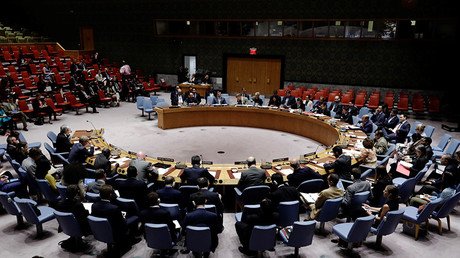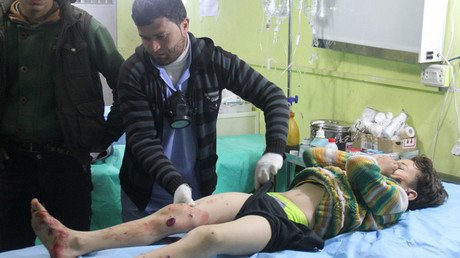‘Full of systemic deficiencies’: Russia slams OPCW report on Idlib chemical attack at UNSC
The OPCW-UN investigation into the chemical attack in Syria’s Idlib province is littered with “systemic deficiencies,” Russia’s deputy UN envoy has told the UN Security Council, reiterating that Moscow maintains the April 4 incident was staged.
On October 26, the OPCW-UN Joint Investigative Mechanism (JIM) issued a report in which it pinned blame for the Khan Shaykhun incident on Damascus. With JIM’s mandate set to expire on November 16, Russia criticized the methodology of the UN fact-finding mission, casting doubt on the mandate’s extension.
“Without a comprehensive change it will become a tool to settle accounts with the Syrian authorities,” Russian deputy representative to the United Nations, Vladimir Safronkov, told the Security Council.
America’s UN envoy, Nikki Haley, meanwhile tried to rally other members of the UN Security Council (UNSC) to renew JIM's mandate. “Anyone who prevents us from achieving this goal is aiding and abetting those who have been using chemical weapons,” she said.
“They are helping to ensure, not just that more women and children will die, but that those women and children will die in one of the cruelest, most painful ways possible.”
After carefully reviewing the “deeply disappointing” conclusions of the probe, Moscow blasted the report which it believes is full of “systemic deficiencies” and speculation, and drawn from statements by questionable sources. Noting that JIM’s report cannot withstand any “serious criticism,” the Russian diplomat said the UN team did not even consider Moscow’s version of events, according to which the entire incident was “choreographed.”
Moscow questioned the validity of biomedical and other samples that were obtained at the scene of the alleged attack. JIM’s report, which is “full of omissions, inconsistencies and contradictions is very mediocre,” Safronkov said. “They did not comply with the basic principle of the chain of custody of the material evidence.”
Russia also accused JIM of implementing their mandate “very selectively without the use of the whole range of methods,” which requires first and foremost “collecting samples, questioning witnesses and gathering evidence directly at the site of the incident.”
The JIM mission never actually visited the site of the alleged attack, Russia pointed out, saying the experts relied on evidence collected by the militant groups controlling the area. The investigation also failed to properly inspect the Shayrat Airbase, Moscow said, explaining that while the experts visited the Syrian airfield, they did not collect ground samples there.
“OPCW worked under the assumption that sarin gas was delivered by a plane, despite failing to gather samples at the Shayrat Airbase site, after finally consenting to visit the strip,” the Russian diplomat said, emphasizing that gathering samples at the base was “crucial to determine the attribution of responsibility.”
READ MORE: Chemical attacks in Syria must be investigated, but current probe unprofessional – Moscow
Some of the evidence gathered by the UN team, Safronkov said, came from highly questionable sources, particularly the White Helmets group that has ties to extremists in Syria.
“OPCW’s mission was not able to obtain key material evidence. All conclusions of their work were based on indirect testimonies, most of which was provided by the opposition and by NGOs that have no credibility, such as the White Helmets which are closely associated with Jabhat al-Nusra terrorists. So to take at face value the information by White Helmets is at very least in not very good taste,” Safronkov told members of the UNSC.
The report also failed to properly explain the delivery of sarin gas to the site in Idlib, Safronkov stated, adding, that the traces left by the explosion, and the lack of fragments, suggest the bomb was placed on the ground. Safronkov pointed out that the crater in Khan Shaykhun was rectangular which is characteristic of a detonation from “a horizontal static position,” while an air dropped bomb would have left an elliptical crater.
The possibility of a staged attack is also “confirmed by the traces of burning at the surface of the cement,” the diplomat said, noting that the “edges of the crater are not turned outward [as would have been the case with the aerial bomb], and there is no ground dispersed around it.” The fact that the impact crater was filled with cement “very soon after the incident,” points to “someone really trying to destroy evidence.”
JIM’s findings, however, contradict Russia’s analysis. Presenting the conclusion of the investigation, the head of the panel, Edmond Mulet, said the experts established that sarin was dropped by a Syrian air strike, claiming the chemical used in Idlib matched those samples previously found in Syrian stockpiles. Such a composition “would be very difficult to replicate,” Mulet said.
Moscow slams OPCW-UN probe into alleged chemical #attack in #Syriahttps://t.co/BuGY0ADtj1pic.twitter.com/Q7vpMfUXDd
— RT (@RT_com) November 1, 2017
Safronkov swiftly challenged that assumption, saying, “the chemicals could have been produced anywhere to intentionally compromise” Syrian authorities. “Admixtures found in the samples cannot be considered as unique markers which are found in the characteristic only for Syrian binary technology for producing sarin,” he elaborated further.
Observation: Shell obliteration suggests high explosive. A munition design not conducive with a #chemical payload. #KhanSheikounpic.twitter.com/d4cgzYWDs4
— Syricide (@Syricide) April 4, 2017
Safronkov also questioned some of the visual evidence referenced in the UN report, noting that the White Helmets apparently knew about the attack even before the Syrian airplane left the Shayrat Airbase. The White Helmets video at the site of the incident shows them wearing respirators and cotton gloves which cannot serve as protective gear against sarin exposure. Thus it is likely that “first an explosion was conducted, then the White Helmets made this video, and only afterward did they drop sarin,” the Russian representative pointed out.
Syrian Idlib chemical incident ‘likely staged,’ requires real investigation – Moscow
An estimated 74-100 or more civilians were killed and hundreds were injured in the April 4 attack, according to various reports. Washington then rushed to blame Damascus based on open-source intelligence, while the Syrian government strongly denied responsibility for the incident.
On April 7, US President Donald Trump authorized the firing of 59 Tomahawk cruise missiles at the Syrian military airfield in Shayrat, from where US intelligence said the chemical attack was launched.














